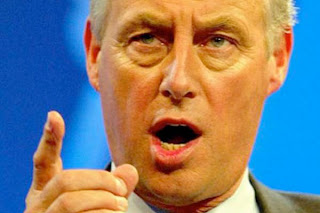
Veteran environmentalist MP Tim Yeo has called the energy minister Ed Davey and his department "weak", and slammed tjhe Treasury, and other departments for interfering in the UK's carbon-reduction and energy policies.
Speaking at today's UK Energy conference organised by The Economist magazine, Tim Yeo, Chair of the Commons Energy and Climate Change Select Committee, slammed the Treasury for constantly interfering with DECC's activities and policy development, confirming (which is news to no one who has been following environmental issues for 30 years) that the Treasury is not at all green.
He didn't stop there, but also laid into the Department for Communities and Local Governments, and the Department for Transport.
He labelled DECC a “weak department" for letting its policies be "crawled all over" by these three other departments and called Ed Davey a “junior partner" in any negotiations.
Referring to the carbon price floor as “the Treasury's latest wheeze" and “simply a way of getting more tax", he said that “the UK needs a carbon price signal not a carbon price floor, which is having the opposite effect to what George Osborne claims".
This is the first time there has been such open admission by an MP at a major energy conference of the existence of such high conflict between these government departments.
Yeo said that if Britain wants to be in the “premier division" internationally in 15 years' time, then energy needs to be higher up the priorities for the Government.
Despite this, he said that the required level of investment in UK energy infrastructure, of £200 billion by 2020 is “achievable", although he said there is no 'plan B' if we fail.
He said that the technology is already to hand to solve our energy crisis but that we don't yet have the right policies and price signals. He expressed alarm that firms like E.ON are pulling out of nuclear power in the UK.
While saying that the UK cannot rely on fossil fuels, whose price will rise due to rising demand, Yeo, a veteran Tory environmentalist, advocated that “we should exploit the shale gas resources we have in this country".
Yet in the same breath he said that replacing coal with gas “doesn't get us anywhere near the Committee on Climate Change 2030 decarbonisation target".
On fuel poverty, he said that it can't just be solved by changes to energy policy because it is also a Social Security issue.
Tony Cocker, Chief Executive Officer, E.ON UK, blamed a pause in investment on last year's review of the Renewables Obligation banding levels, and its (in investment terms) imminent demise in 2017.
Electricity market reform delay
Cocker, said that the UK needs the electricity market reform to happen speedily and not just be a “make do and mend" solution. "We are not asking for an extension of CERT and CESP we are pretty sure we can hit the targets" we have on fuel poverty, he added.
All the panel agreed that certainty was urgently needed on the planned reforms, especially in the light of alarming reports by the BBC last night that legislation on the topic would be postponed this summer to make room in the parliamentary timetable for reform on the House of Lords.
This was immediately denied by a Department for Energy and Climate Change spokeswoman, who said, “This is categorically untrue. We have said for some time that we intend to legislate for electricity market reform in the forthcoming session of Parliament”.
On the issue of energy pricing and investment, Cocker said of E.ON “We need the trust of our customers to create a sustainable energy system", somewhat ironically given the number of protesters outside the conference who were not permitted to enter.
He admitted that his company “needs more transparency on pricing and profits", and laid the gauntlet down by promising to put the extent of his bonus in the public domain.
The panel chairman, the BBC's Energy and Environment Analyst Roger Harrabin, earlier asked the organisers why protesters who had gathered outside the building, part of a Climate Justice day of action, were not being allowed in, and was told that the conference programme had been changed to reflect popular concerns about fuel poverty, and that they and grassroots organisations would be invited to next year's event.
Raising laughter, Mr. Harrabin summarised six months of energy policy in eight words as: “FiTs fiasco, nuclear no-show, wind whiplash and shale shivers".
Investment challenges
Speaking for the Carbon Trust, its CEO Tom Delay admitted that “sustainable solutions are difficult to invest in because they are capital intensive" and because of the uncertainty around costs.
He said that “light touch energy regulation" is deterring investment in “resilience, efficiency and an overhaul of the National Grid".
However, he advised that “it's dangerous to always focus on cost rather than investment"; it's the lifetime savings on bills that should be the chief criteria for investment decisions.
That is why the quick payback received from investing in energy efficiency makes it an “easier option" for large companies to be sustainable.
He slated UK building standards on energy efficiency for being too low, a decade or two behind those in Europe and North America.
Fuel poverty
The London School of Economics' Professor John Hill, author of last March's landmark Fuel Poverty Review, astonished the audience by explaining that under current definitions of fuel poverty, the Queen qualifies since over 10% of income is spent on fuel.
He said that a better criteria for fuel poverty is to measure the overlap between low incomes and high energy costs.
No comments:
Post a Comment